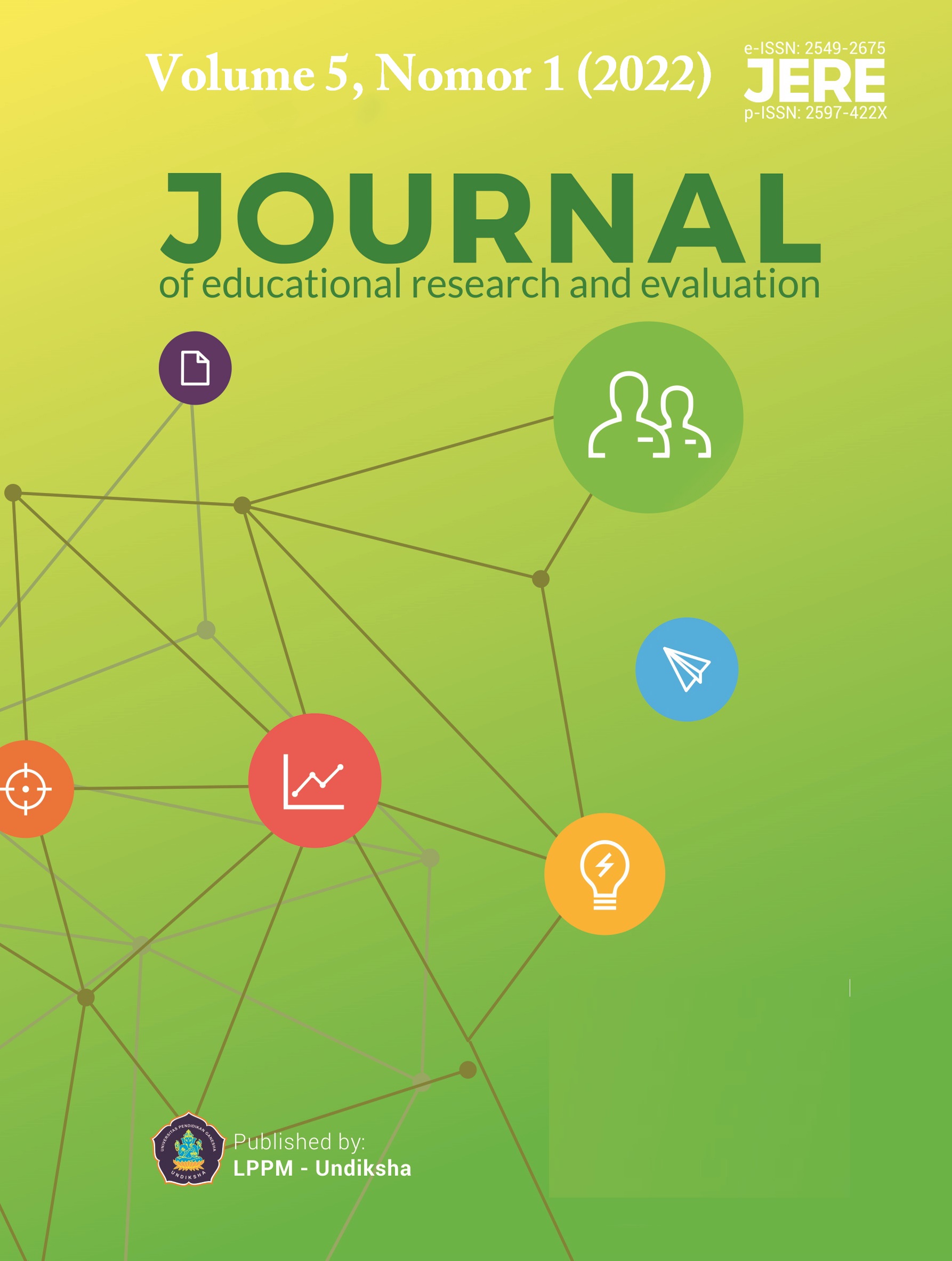Self-regulated Learning Model Affects Students’ Mathematical Conceptual Understanding and Self-confidence in terms of Cognitive Styles
DOI:
https://doi.org/10.23887/jere.v5i1.30517Keywords:
self-regulated, self-confidence, mathematicsAbstract
The main problem in mathematics learning is to form students’ understanding and self confidence. The aim of this study is to analyze the impact of self-regulated learning model on conceptual understanding and self-confidence in terms of cognitive styles. This study was a quasi-experimental study which applies treatment by level design, where the treatment is learning model for students with different cognitive style level. The samples of the study are 80 students in four classes, who are selected using cluster random sampling technique. Data on conceptual understanding are collected by using conceptual understanding test in the form of essay test. While the data on the students’ self-confidence are collected using questionnaires. The data collected are anayzed using manova. The results of the study indicate that self-regulated learning has positive impact on the students’ conceptual understanding and self-confidence (F = 8,796; p < 0,05). Thus, it could be concluded that learning model and cognitive style give significant impact on the students’ conceptual understanding and self-confidence in terms of cognitive styles.
References
Abdul, G. K., & Abidha, K. (2016). Self-regulated learning: a motivational approach for learning mathematics. International Journal of Education and Psychological Research (IJEPR), 5(3), 78 – 89. https://doi.org/https://files.eric.ed.gov/fulltext/ED577702.pdf
Anwar, R. B., Yuwono, I., As’ari, A. R., Sisworo., & Rahmawati, D. (2016). Mathematical representation by students in building relational understanding on concepts of area and perimeter of rectangle. Academic Journals (Educational Research and Reviews), 11(21), 2002–2008. https://doi.org/https://files.eric.ed.gov/fulltext/EJ1119681.pdf
Bekomson, A. N., Amalu, M. N., Mgban, A. N., & Kinsley, A. B. (2020). Interest in Extra Curricular Activities and Self Efficacy of Senior Secondary School Students in Cross River State, Nigeria. International Education Studies. https://files.eric.ed.gov/fulltext/EJ1261728.pdf
Bingol, T. Y., Batik, M. V., Hosoglu, R., & Kodaz, A. F. (2019). Psychological resilience and positivity as predictors of self-efficacy. Asian Journal of Education and Training, 5(1), 63–69. https://files.eric.ed.gov/fulltext/EJ1202241.pdf
Candiasa, I. M. (2010). Statistik multivariat disertai aplikasi dengan SPSS. Singaraja: Universitas Pendidikan Ganesha.
Ceran, S. A., & Ates, S. (2020). Conceptual understanding levels of students with different cognitive styles: an evaluation in terms of different measurement techniques. Eurasian Journal of Educational Research, 8(8), 149 – 178. https://ejer.com.tr/public/assets/catalogs/0076033001596714403.pdf
Cetin, B. (2017). The influence of pintrich’s self-regulated learning model on elementary teacher candidates in a life science course. Journal of Education and Training Studies, 5(8), 113 – 127. https://doi.org/https://doi.org/10.11114/jets.v5i8.2460
Daryanto. (2005). Evaluasi pendidikan. Jakarta: Rineka Cipta.
Djaali. (2011). Psikologi Pedidikan. Jakarta: Bumi Aksara.
Fatimah, S. K., Efendi, R., & Liliawati, W. (2020). Pengaturan Diri Peserta Didik Sma Terhadap Prestasi Akademik Pada Materi Usaha Dan Energi. Jurnal Pendidikan Fisika, 8(2). https://doi.org/http://dx.doi.org/10.24127/jpf.v8i2.3012
Ghufron, M. N., & Risnawati, R. S. (2011). Teori-teori psikologi. Yogyakarta: Ar-Ruz Media.
Hazadiyah, D., Kardinah, N., & Sunardi, I. (2012). Hubungan Antara Kompetensi Sosial Dan Kepercayaan Diri Pada Siswa. Psympathic: Jurnal Ilmiah Psikologi, 5(2). https://doi.org/https://doi.org/10.15575/psy.v5i2.2160
Laura, R., & Phil, K. (2018). Adult beginner instrumentalists‟ practice, self-regulation, and self-efficacy: a pilot study. Journal of Education and Training Studies, 6(5). https://doi.org/https://doi.org/10.11114/jets.v6i5.2978
McCluskey, C., Mitchelmore, M., & Mulligan, J. (2016). The role of reasoning in the Australian curriculum: Mathematics. Mathematics Education Research Group of Australasia, 447–454. https://files.eric.ed.gov/fulltext/ED572330.pdf
Melissa, N. L. (2016). Interaction effect of gender and motivational belief on self-regulated learning: a study at ICT-integrated school. Malaysian Journal of Learning and Instruction, 13(3), 25–41. https://www.researchgate.net/deref/http%3A%2F%2Fdx.doi.org%2F10.32890%2Fmjli2016.13.1.2
Nazir, M. (2003). Metode penelitian. Jakarta: Ghalia Indonesia.
Ningsih, Y. L. (2016). Kemampuan Pemahaman Konsep Matematika Mahasiswa Melalui Penerapan Lembar Aktivitas Mahasiswa (LAM) Berbasis Teori APOS Pada Materi Turunan. Edumatica: Jurnal Pendidikan Matematika, 6(1). https://doi.org/https://doi.org/10.22437/edumatica.v6i01.2994
Qohar, A., & Sumarmo, U. (2017). Improving mathematical communication ability and self-regulation learning of Junior High School student by using reciprocal teaching. IndoMs. J.M.E, 4(1), 59–74. https://doi.org/https://doi.org/10.22342/jme.4.1.562.59-74
Santyasa, I. W. (2012). Pembelajaran inovatif. Singaraja: Universitas Pendidikan Ganesha.
Situmorang, Z. R. D., & Latifah, M. (2014). Pengaruh Dukungan Sosial, Konsep Diri, Dan Strategi Pengaturan Diri Dalam Belajar Terhadap Prestasi Akademik. Jurnal Ilmu Keluarga Dan Konsumen, 7(3). https://doi.org/https://doi.org/10.24156/jikk.2014.7.3.154
Susanti, E. L., Sukestiyarno, Y. L., & Sugiharti, E. (2012). Efektivitas Pembelajaranmatematika Dengan Metode Problemposing Berbasis Pendidikan Karakter. Unnes Journal of Mathematic Education, 1(1), 13–19. https://doi.org/https://doi.org/10.15294/ujme.v1i1.255
Tezci, E., Sezer, F., Aktan, S., & Gurgan, U. (2016). Do Lifestyle self-regulated learning strategies. Eurasian Journal of Educational Research, 6(5), 239–258. http://10.0.57.97/ejer.2016.65.14
Ulfah, N. M., Ulfah, N. M., Indrawati, S. A., & Hidayat, D. R. (2012). Konseling Individual Pendekatan Behavioral (Token Ekonomi Dan Pengaturan Diri) Untuk Meningkatkan Penyesuaian Diri Belajar Siswa (Studi Single Subject Experiment Pada 1 Siswa SMP Negeri 6 Bekasi). Insight: Jurnal Bimbingan Dan Konseling, 1(1). https://doi.org/https://doi.org/10.21009/INSIGHT.011.09
Wang, C. H., Harrison, J., Cardullo, V., & Lin, X. (2018). Exploring the relationship among international students’ english self-efficacy, using english to learn self-efficacy, and academic self-efficacy. Journal of International Students, 8(1), 233–250. https://files.eric.ed.gov/fulltext/EJ1166753.pdf
Woottipong, K. (2020). Investigation into Thai High School learners’ self-regulated learning skills, self-efficacy and writing performance. Research in Pedagogy, 10(1), 32–49. http://10.0.23.49/istrped2001032W
Downloads
Published
How to Cite
Issue
Section
License
Authors who publish with the Journal of Evaluation and Research in Education (JERE) agree to the following terms:
- Authors retain copyright and grant the journal the right of first publication with the work simultaneously licensed under a Creative Commons Attribution License (CC BY-SA 4.0) that allows others to share the work with an acknowledgment of the work's authorship and initial publication in this journal.
- Authors are able to enter into separate, additional contractual arrangements for the non-exclusive distribution of the journal's published version of the work (e.g., post it to an institutional repository or publish it in a book), with an acknowledgment of its initial publication in this journal.
- Authors are permitted and encouraged to post their work online (e.g., in institutional repositories or on their website) prior to and during the submission process, as it can lead to productive exchanges, as well as earlier and greater citation of published work. (See The Effect of Open Access)











